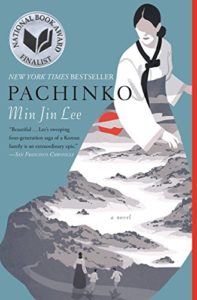
I loved this book so much. I think it’s one of my favorites int he last couple years. It’s kind of a quiet story it’s about normal people living relatively normal lives, or at least normal for their situation, so it’s kind of a quite, slow meander of a book. There is no real climax or resolution to speak of, it’s a bit more circular in it’s plotting.
This is the story of four generations in a Korean family that lived during the Japanese occupation of Korea through WWII and then after. Sunja was born in a village outside of Busan to her poor, but hardworking and proud parents. Her father had a club foot and a harelip, so he had gown up pretty much assuming he would never have a family. When the matchmaker arranges for him to marry, and after Sunja is born his family is the most valuable thing in his life and she grows up in a very loving household. After he dies, Sunja and her mom continue to run the boarding house and rely on each other to keep everything working.
Sunja falls for the young, handsome fish broker who seduces her. When Sunja ends up pregnant she discovers that not only is he married, but he’s wrapped up in the Yakuza’s Korean enterprises. She isn’t sure what she will do, at which point the young, tubercular minister who is staying in the boardinghouse decides that he wants to marry her. They marry and he takes her to Japan, where he has been employed at a small church in the Korean district. He welcomes her son as his own when he is born, and they also have another son. The story continues on through Sunja’s life, including her husband’s brother and his wife and her sons and her grandchildren as they navigate life in Japan, where Koreans are always considered suspect immigrants, even if they were born in Japan.
As I indicated earlier, this is a quiet book that tells the story of a strong, resourceful woman and what strong, resourceful women do to survive and thrive in a world that doesn’t really care what happens to them. The characters are so strongly written I feel like I’ve met real people, not read about characters in a book. It was also very interesting, as this is a part of history that was very glossed over in my history classes here in the US. I think the Japanese occupation of Korea was covered in a paragraph or two, and had very little information on how the Korean people were treated, not just up through the war, but after as well. I’m glad I was able to expand my knowledge, even just a little, through this book.